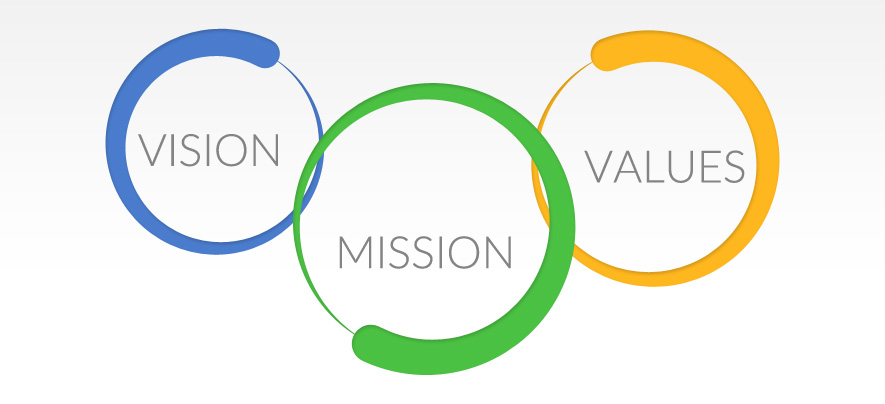Your Company’s Values Can Raise Your Company’s Value

ความเป็นผู้นำและการจัดการ
498 week ago — ใช้เวลาอ่าน 8 นาที
In Does Your Company Have Inspiring Mission & Vision Statements? Learn How To Create Them, we discussed the mission statement as a statement of purpose – your company’s raison d’etre (reason for existence).
Having discussed mission and vision, we now discuss values.
What Are Organisational Values?
Values are the guiding principles that help your organisation understand how things should be done. They are your organisation’s basic beliefs and go a long way in dictating corporate culture.
In other words, values are either a belief or a set of beliefs that govern your organisation’s actions, including what it thinks is right or wrong, good or bad, worthy or not worthy. Values govern the choices that individuals in your organisation make.
Though values help your organisation adhere to certain guidelines, they are not to be mistaken for rules.
Values help decide and set out norms relating to operational guidelines such as:
- Quality standards: the kind of activities you would carry out or not carry out
- How you would want others to see your organisation
- What you would want your staff to believe and act in your organisation
- How your staff sees and projects the organisation through its activities and behaviour
Your company’s values need to be discussed thoroughly and agreed on mutually.
Moreover, values help people in your organisation by:
- Binding them together
- Giving them a shared meaning
- Bringing energy into the organisation
- Bringing about cohesiveness as people understand each other better
Your organisation then has shared values that percolate down to everyone within it.
Since values shape behaviour, it makes great sense for organisations to have a set of values and to articulate them.
Will these values work on staff who have come in from other organisations that had differing or even conflicting values? There are two answers to this.
It is up to the senior people within your organisation to help all your employees imbibe the values of your organisation. This is facilitated to a large extent by the behaviour and conduct of your people within the organisation.
- The Power of Repetition – Something repeated often becomes habit
- The Pygmalion Effect – The behaviour and attitude of others within the organisation is transferred to others over time
Beliefs get translated into accompanying behaviours. Conversely, behaviours are seen as a result of beliefs. Therefore, a newcomer in the organisation can and will see subtle signs that will also permeate into her/him.
What kind of values might an organisation have? Values could include things like integrity, caring, or even sharing. An international advertising agency, for instance, has a value that everyone is a contributor and therefore no one within the organisation is a hero. This means that the no single person gets credit for the advertising made. Everything is attributed to teamwork.
A data centre, besides having other values, might have values related to integrity and security.
While values are philosophy that guide actions, a code of good governance takes off from these values and helps people within the organisation by providing a set of Dos and Don’ts. Values are principles and the code is about desired behaviour arising out of this.
Not Sure How To Work Out Values For Your Organisation? Here Are Simple Tips:
- Identify what you would like to be and be seen as
- Identify things you would like to avoid doing
- Identify things that you would like to be seen not doing
- Understand what would make you and your people feel happy, proud and good about themselves
- Understand what would make others feel happy about you and your organisation
- Now use these to list down a set of values
- Choose the two or three that you would give the most priority to.
- Reword these to make them easily understood
How Values Are Percolated Down
Values do get percolated down the organisation. It is a continuous process. Every action sends out a clear signal – and this signal is either in congruence or not in congruence with the values that you may want to instil. The following process explains how values are percolated
- Manager has values
- Results in her/his behaviour and actions
- These values shape the environment within the organisation
- Values are observed by subordinates
- Values are absorbed by subordinates
- Values then get transferred to others
- Clients, vendors and other stake holders observe these common values and attach meaning to them and form an overall opinion about the organisation
How Values Help Your Organisation
Values play an important role in sending the right signals to all the stakeholders and influencing the corresponding actions. Here are some of the ways values help your organisation:
Establish Trust
Values help establish trust as stakeholders know that employees in the organisation will behave in a way that is consistent to the organisation’s values, and that these values are reflected in every action of the organisation.
Establish Credibility
A set of values brings in credibility as the observer knows that there is a reason for every action.
Bring in Cohesiveness
Everyone understands why certain things are done or avoided and this leads to greater understanding as well as cooperation.
Set Expectations
This is most important since every stakeholder, be it client, vendor or employee knows what to expect and why to expect it.
What are your organisation’s values? What do your employees and other stakeholders see your organisation’s values as? Is there a difference between the two? Do share – it would help all of us learn more. After all, GlobalLinker is a platform that strives to help others as well as itself continuously refine and improve.
True story - A well-known courier company in India had as one of its values that it would neither accept nor pay out any consideration whatsoever for any kind of work that was not rightfully or lawfully earned. An extension of this value was that they would not deal in any form of cash or payment that was not accounted for by either them or the other party. This initially led to many issues, particularly in the matters of buying office space as the industry accepted payments that were not accounted for. This organisation found a way around this dilemma – by renting or leasing offices. The author has personally observed a case where this organisation’s parcels were the only ones that were not checked very stringently because the security handlers in the cargo section of the airport were aware that this particular courier’s integrity was irreproachable.
To explore business opportunities, link with me by clicking on the 'Invite' button on my eBiz Card.
Disclaimer: The views and opinions expressed in this article are those of the author and do not necessarily reflect the views, official policy or position of GlobalLinker.
โพสต์โดย
Ajoy VakilYour Virtual Chief Marketing Officer DirectMart offers a host of S.MAR.T services (Strategy, Marketing and Training) that help you reach where you want to go! We help you in...
ดูโปรไฟล์ของ Ajoy
Most read this week
Trending












Comments
Share this content
Please login หรือ สมัครสมาชิก to join the discussion